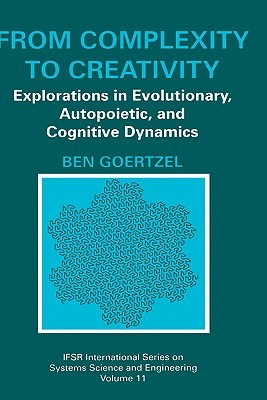
- We will send in 10–14 business days.
- Author: Ben Goertzel
- Publisher: Springer
- ISBN-10: 0306455188
- ISBN-13: 9780306455186
- Format: 16 x 23.6 x 3.4 cm, kieti viršeliai
- Language: English
- SAVE -10% with code: EXTRA
Reviews
Description
Cybernetic pioneer Warren McCullough asked: What is a man, that he may know a number; and what is a number, that a man may know it? Thinking along much the same lines, my question here is: What is a creative mind, that it might emerge from a complex system; and what is a complex system, that it might give rise to a creative mind? Complexity science is a fashionable topic these days. My perspective on complexity, however, is a somewhat unusual one: I am interested in complex systems science principally as it reflects on abstract mathematical, computational models of mind. In my three previous books, The Structure of Intelligence, Evolving Mind, and Chaotic Logic, I have outlined a comprehensive complex-systems-theoretic theory of mind that I now call the psynet model. This book is a continuation of the research program presented in my previous books (and those books will be frequently referred to here, by the nicknames EM and CL). One might summarize the trajectory of thought spanning these four books as follows. SI formulated a philosophy and mathem- ics of mind, based on theoretical computer science and the concept of pattern. EM analyzed the theory of evolution by natural selection in similar terms, and used this computational theory of evolution to establish the evolutionary nature of thought.
EXTRA 10 % discount with code: EXTRA
The promotion ends in 21d.20:04:46
The discount code is valid when purchasing from 10 €. Discounts do not stack.
- Author: Ben Goertzel
- Publisher: Springer
- ISBN-10: 0306455188
- ISBN-13: 9780306455186
- Format: 16 x 23.6 x 3.4 cm, kieti viršeliai
- Language: English English
Cybernetic pioneer Warren McCullough asked: What is a man, that he may know a number; and what is a number, that a man may know it? Thinking along much the same lines, my question here is: What is a creative mind, that it might emerge from a complex system; and what is a complex system, that it might give rise to a creative mind? Complexity science is a fashionable topic these days. My perspective on complexity, however, is a somewhat unusual one: I am interested in complex systems science principally as it reflects on abstract mathematical, computational models of mind. In my three previous books, The Structure of Intelligence, Evolving Mind, and Chaotic Logic, I have outlined a comprehensive complex-systems-theoretic theory of mind that I now call the psynet model. This book is a continuation of the research program presented in my previous books (and those books will be frequently referred to here, by the nicknames EM and CL). One might summarize the trajectory of thought spanning these four books as follows. SI formulated a philosophy and mathem- ics of mind, based on theoretical computer science and the concept of pattern. EM analyzed the theory of evolution by natural selection in similar terms, and used this computational theory of evolution to establish the evolutionary nature of thought.


Reviews